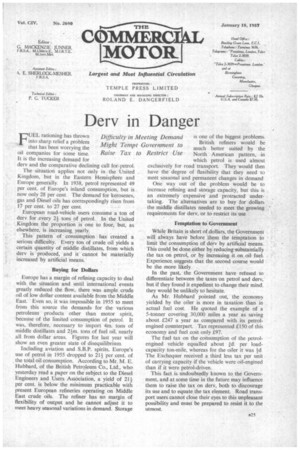Dery in Danger
Page 33

If you've noticed an error in this article please click here to report it so we can fix it.
Difficulty in Meeting Demand Might Tempt Government to Raise Tax to Restrict Use
FUEL rationing has thrown into sharp relief a problem that has been worrying the oil companies for some time. It is the increasing demand for dery and the comparative declining call for.petrol.
The situation applies not only in the United Kingdom, but in the Eastern Hemisphere and Europe generally. In 1938, petrol represented 49 per cent. of Europe's inland consumption, but is now only 28 per cent The demand for kerosenes, gas and Diesel oils has correspondingly risen from 17 per cent. to 27 per cent.
European road-vehicle users consume a ton of dery for ,every 21 tons of petrol. In the United Kingdom the proportion is one to four, but, as elsewhere, is increasing yearly.
Thispattern of consumption has created a serious difficulty. Every ton of crude oil yields a certain quantity of middle distillates, from which dery is •produced, and it cannot be materially increased by artificial means.
Buying for Dollars Europe has a margin of refining capacity to deal with the situation and until international events greatly reduced the flow, there was ample crude oil of low dollar content available from the Middle East. Even so, it was impossible in 1955 to meet from this source the demands for the various petroleum products other than motor spirit, because of the limited consumption of petrol. It was, therefore, necessary to import 4m. tons of middle distillates and 21m. tons of fuel oil, nearly all from dollar areas. Figures for last year will show an even greater state of disequilibrium.
Including aviation and S.B.P. spirits, Europe's use of petrol in 1955 dropped to 211 per cent. of the total oil consumption. According to Mr. M. E. Hubbard, of the British Petroleum Co., Ltd., who yesterday read a paper on the subject to the Diesel Engineers and Users Association, a yield of 211 per cent. is below the minimum practicable with present European refineries operating on Middle East crude oils. The refiner has no margin of flexibility of output and he cannot adjust it to meet heavy seasonal variations in demand. Storage is one of the biggest problems.
British refiners would be much better suited by the North American pattern, in which petrol is used almost exclusively for road transport. They would then have the degree of flexibility that they need to meet seasonal and permanent changes in demand One way out of the problem would be to increase refining and storage capacity, but this is an extremely expensive and protracted undertaking. The alternatives are to buy for dollars the middle distillates needed to meet the growing requirements for derv. or to restrict its use Temptation to Government While Britain is short of dollars, the Government will always have before them the temptation to limit the consumption of rdery by artificial means. This could be done either by reducing-stibstantially the tax on petrol, or by increasing it on oil fuel. Experience suggests that the second course would be the more likely.
In the past, the Government have refused to differentiate between the taxes on petrol and derv, but if they found it expedient to change their mind. they would be unlikely to hesitate.
As Mr. Hubbard pointed out, the economy yielded by the oiler is more in taxation than in actual fuel cost. He quoted the example of a 5-tonner covering 30,000 miles a year as saving about £247 a year as compared with its petrolengined counterpart. Tax represented £150 of this economy and fuel cost only £97.
The fuel tax on the consumption of the petrolengined vehicle equalled about d. per loadcapacity ton-mile, whereas for the oiler it was 14 The Exchequer received a third less tax per unit of carrying capacity if the vehicle were oil-engined than if it were petrol-driven.
This fact is undoubtedly known to the Government, and at some time in the future may influence them to raise the tax on derv, both to discourage its use and to equate the tax element. Road transport users cannot close their eyes to this unpleasant possibility and must be prepared to resist it to the utmost.








































































































